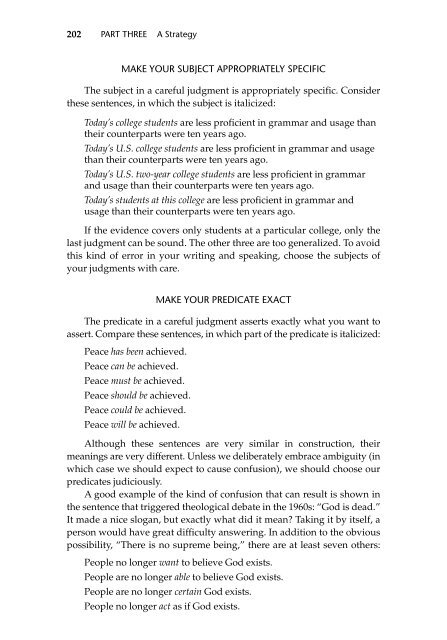Beyond Feelings
Beyond Feelings
Beyond Feelings
You also want an ePaper? Increase the reach of your titles
YUMPU automatically turns print PDFs into web optimized ePapers that Google loves.
202 PART THREE A Strategy<br />
MAKE YOUR SUBJECT APPROPRIATELY SPECIFIC<br />
The subject in a careful judgment is appropriately specific. Consider<br />
these sentences, in which the subject is italicized:<br />
Today’s college students are less proficient in grammar and usage than<br />
their counterparts were ten years ago.<br />
Today’s U.S. college students are less proficient in grammar and usage<br />
than their counterparts were ten years ago.<br />
Today’s U.S. two-year college students are less proficient in grammar<br />
and usage than their counterparts were ten years ago.<br />
Today’s students at this college are less proficient in grammar and<br />
usage than their counterparts were ten years ago.<br />
If the evidence covers only students at a particular college, only the<br />
last judgment can be sound. The other three are too generalized. To avoid<br />
this kind of error in your writing and speaking, choose the subjects of<br />
your judgments with care.<br />
MAKE YOUR PREDICATE EXACT<br />
The predicate in a careful judgment asserts exactly what you want to<br />
assert. Compare these sentences, in which part of the predicate is italicized:<br />
Peace has been achieved.<br />
Peace can be achieved.<br />
Peace must be achieved.<br />
Peace should be achieved.<br />
Peace could be achieved.<br />
Peace will be achieved.<br />
Although these sentences are very similar in construction, their<br />
meanings are very different. Unless we deliberately embrace ambiguity (in<br />
which case we should expect to cause confusion), we should choose our<br />
predicates judiciously.<br />
A good example of the kind of confusion that can result is shown in<br />
the sentence that triggered theological debate in the 1960s: “God is dead.”<br />
It made a nice slogan, but exactly what did it mean? Taking it by itself, a<br />
person would have great difficulty answering. In addition to the obvious<br />
possibility, “There is no supreme being,” there are at least seven others:<br />
People no longer want to believe God exists.<br />
People are no longer able to believe God exists.<br />
People are no longer certain God exists.<br />
People no longer act as if God exists.


